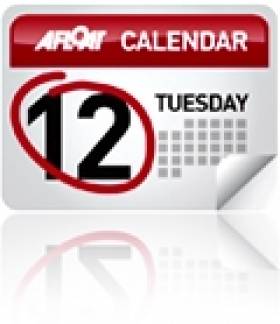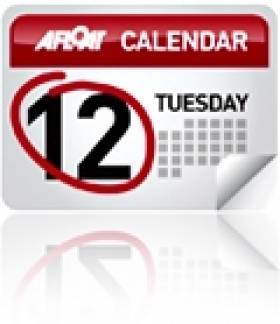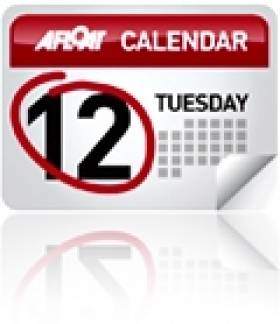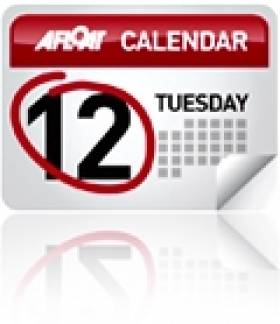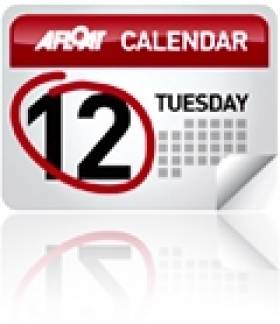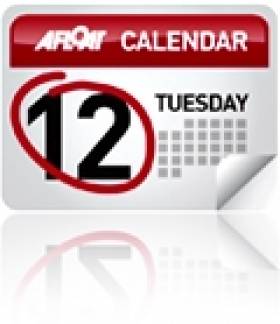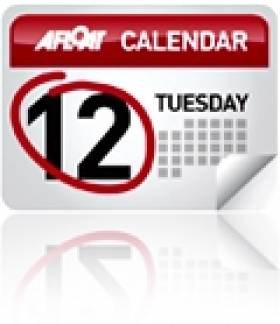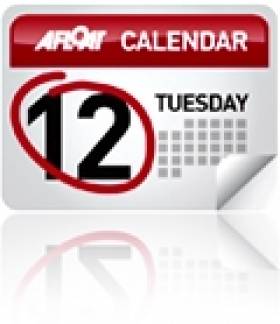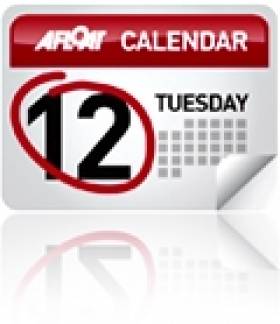Displaying items by tag: Afloat Calendar Dates
#SeafrontTours- The Seafront Memorials Tour is a free guided tour that is part of Dun Laoghaire-Rathdown County Council's annual Summer of Heritage programme.
The first tour begins this Sunday 5 July and will be held every Sunday throughout the summer until 6 September.
Meeting Point: Queen Victoria Fountain, Dún Laoghaire.
Wheelchair accessible.
This is an outdoor event.
Enjoy a tour of the coastal memorials in Dún Laoghaire including the Queen Victoria Fountain, George IV Memorial, the mailboat Leinster's anchor,Christ the King, the Crimean War Cannon and the 1895 Lifeboat Disaster.
Tour Time Start: 11.30am
One tour per day
One event per week
Tour duration: 60 mins
Maximum capacity: 20 people
For more information on other events download the Summer of Heritage brochure here
Table Quiz & Wine Tasting Fundraiser for National Maritime Museum
#Wine&TableQuiz- Come along for a fun night combining a Table Quiz & Christmas Wine Tasting on Thursday 11 December (doors open 7.15pm) at the Eblana Club (off Marine Road) in Dun Laoghaire. The festive evening is to raise funds for the local National Maritime Museum of Ireland.
A selection of wines to match your Christmas feast will be available to taste.
Following this there will be the Table Quiz (8.30pm). The familiar mix of obvious and obscure questions are guaranteed to infuriate all who take part.
Tickets for the festive fundraiser event are €10.00 each and available from the door. In addition for more information on bookings made by email [email protected] or by contacting (01) 2143 964
Fun-Fundraiser: Christmas Table Quiz Night in Aid of RNLI
#TableQuiz - The Glenua and friends monthly winter lectures for 2014/15 resumed last month in the Poolbeg Yacht & Boat Club, Dublin and instead of a talk for December, a Christmas Table-Quiz in aid of the RNLI is organised for Thursday 4 December at 8pm.
During last year's lecture season, a total €837 was raised for the RNLI. Kieran Cotter, Coxwain of the RNLI Baltimore lifeboat was presented with the donation from Mick O'Meara, President of Glenua.
So on this occasion, the fundraising efforts continue with the Christmas Table Quiz, an event which welcomes everyone to take part either solo or with friend at the venue in Ringsend.
A table of four is €40 and all is in good cause for the life-saving rescue service.
Joe Varley well known for his lectures over the years, has volunteered his services as Quizmaster. For further details contact 087 2129614.
Lecture: The Asgard, from Launch to Gun Running to Conservation
#AsgardLecture - The History of Asgard, from Launch to Gun Running to Conservation is the title of a lecture by Pat Murphy which is to take place in the National Maritime Museum of Ireland, Dun Laoghaire.
The lecture is on Thursday November 20th (8pm). Tickets costing €10 will be made available at the door opening at 7.30pm.
Murphy will tell the life of this famous yacht in Irish history from her launch in 1905 to current conservation in Collin's Barracks Museum.
Asgard undertook a 23 day voyage that centred on the dangerous mission to collect guns and ammunition for the Irish Volunteers. The landing of the arms took place in Howth Harbour in July 1914 and this historical event is described in detail with unique photographs.
The lecture will also feature Conor O'Brien's Kelpie and the Kilcoole landing.
In this centenary year of the anniversary of the Howth gunning event, the lecture will also cover commemorative celebrations.
In addition to tickets payable at the door, bookings can be made in advance by email: [email protected] and by contacting the NMMI on (01) 2143 964
For more details about the Maritime Institute of Ireland's museum which has a gift shop and café, visit: www.mariner.ie
Lecture: The Ketch Ilen - Ireland's Sole Surviving Sail Trader
#LectureILEN - "The Ketch Ilen-Ireland's Sole Surviving Sail Trader" will be the public lecture presented by Gary Mac Mahon next Thursday (7 November) in the Poolbeg Yacht and Boat Club, Ringsend.
The talk which forms the members of Les Glénans & friends 2013/2014 lecture series starts at 20.00hrs in the Dublin docklands venue noting an entry fee of €5 in aid of the RNLI.
Ilen is a 56-ft sailing ketch that was built in 1926 in the Baltimore Fishery School Boatyard for the Falkland Islands Company. She was designed and sailed to the Falkland Islands by Conor O'Brien who in 1925 was the first Irishman to complete a circumnavigation of the world in the 42-ft ketch, Saoirse, also built in Baltimore.
The Ilen served seventy years as a trading vessel in the tempestuous seas of the South Atlantic before being brought back to Ireland in 1998.
Now being restored, she is the focal point for a remarkable maritime project embracing the A.K. Ilen School for wooden boatbuilding in Limerick and Hegarty's boatyard in Oldcourt.
Gary McMahon, in his illustrated presentation, will provide the background to the return of the Ilen to Ireland and the founding of the A.K. Ilen Company with Anthony Keane OSB.
It is an Irish-registered charity dedicated to education through the medium of sailing, very much in the spirit of the original aims of Glénans
Gary is a keen offshore sailor who publishes maritime books through the A.K. Ilen Company and will include Conor O'Brien and his exploits on Saoirse in his lecture.
For further details on this lecture contact: 087 2129614 and details for the Poolbeg Yacht, Boat Club & Marina visit: www.poolbegmarina.ie
Lockout Lectures: Dun Laoghaire & The Marine
#LockoutLectures – The 1913 Lockout –Dun Laoghaire & The Marine is the theme to a series of lectures to be held on Sunday 25 August in the Dun Laoghaire Club, 3 Eblana Avenue which is off Marine Road.
The afternoon event (donation request) is to be hosted by the Maritime Museum of Ireland which runs the nearby National Maritime Museum of Ireland and to where as previously reported this venue is run an exhibition on the 1913 Lockout.
The lecture programme in the Dun Laoghaire Club, is listed as follows:
12noon "Kingstown-Portrait of an Edwardian Seaport Town" – Peter Pearson
1pm "The 1913 Lockout –International Context" – Colin Whitson
2pm "Women in the 1913 Lockout" – Mary Muldowney
3pm "Dublin Dock Communities and the Legacy of 1913" – Joe Mooney
3.45pm "Dun Laoghaire in 1913 –Stronghold of Unionism or Frontier of New Unionism?" – Padraig Yeates
4.30pm "Patrick Moran: Trade Unionist, Sportsman and Patriot" – May Moran
5.15pm "Edward Lee –The 'Model Employer' – Mike Lee
If visiting the National Maritime Museum which is open every day 11am-5pm, noting admission fees, there is a gift shop and café in addition to wheelchair accessibility, though some areas have restricted access. For mor details visit:www.mariner.ie
Location, the museum is in the former Mariners Church on Haigh Terrace, which can be reached from Lower Georges Street or from the coast road, noting pedestrian access over the DART railway line (opposite the East Pier), or by strolling along The Metals.
Baroque Concert in Old Mariners Church
#BaroqueConcert – Dublin-based early music ensemble Respicio are to perform in the National Maritime Museum of Ireland (NMMI), Dun Laoghaire this Friday 31 May.
Come along to the hear music by Teleman, Bach & Graupner, starting at 8pm (tickets cost €10) in the unique surroundings of the maritime museum. The restored former Mariners Church, was awarded earlier this year the Best Museum / Restored Site at the 2012 Industrial Heritage Association of Ireland Awards.
The museum is (mostly) wheelchair accessible and during normal opening hours, 11am-5pm every day, there is a Museum Café serving hot snacks throughout. There is also a WiFi hotspot. For further information about the museum run by the Maritime Institute of Ireland visit: www.mariner.ie
Lecture: MSC Napoli – The Inside Story
#Lecture – The inside story of MSC Napoli, the containership which became the UK's largest, most complicated and most expensive shipwreck and salvage operation and will be the topic of a lecture held on Tuesday 23 April.
Robin Middleton CBE, former Secretary of State Representative of the United Kingdom, who took all the pivotal decisions during the disaster, will present the lecture in the National Maritime Museum of Ireland (NMMI) in Dun Laoghaire.
Lecture begins at 8:00 pm noting an admission fee of € 10. For bookings contact the maritime museum Tel: (01) 2143965, by email: [email protected]
For more information about the Maritime Institute of Ireland's maritime museum visit: www.mariner.ie
Concert: Chamber Choir from US to Sing in Maritime Museum
#ChoirConcert - A varied and exciting programme of accessible music from one of America's leading high school choirs, the Hood Valley River High School Choir is to be held in the Maritime Museum in Dun Laoghaire.
The evening will Include the Aurora Group, consisting of around 20 girls from the HRV choir will sing more modern and secular music next Thursday 28 March starting 8pm.
Tickets cost €10 per person and for a group rate of €7 pp (based on groups of 10 or more)
For further information and to book call: (01) 2143964 Email [email protected]
Lecture: ‘The Log of the Molly B' Sailing Around the World
#Lecture – Dubliner Pete Hogan, a well-known artist specialising in painting boats is to present a lecture titled "The Log of the Molly B - Building and sailing a gaff-rigged ketch around the World".
The lecture takes place next Wednesday 13 March at 20:00 in Poolbeg Yacht and Boat Club, Ringsend, in the heart of Dublin Port.
Pete has been sailing all his life usually out of Dun Laoghaire but also in the Clew Bay area of Mayo. He worked as a commercial fisherman, as a deck hand on yachts and in the office of a paper company. In 1975 he emigrated to Vancouver, Canada.
Three years later he said 'To hell with this. I'm going to build a boat... ' He built a 30 foot double ended gaff rigged ketch and sailed it through the Panama Canal and back to Ireland without motor or electronics.
He then sailed Molly B around the World by way of the infamous Cape Horn. Embarking on a third voyage, Molly B sank in a storm in the Mediterranean and he was lucky to survive.
Pete recently published an illustrated book about his adventures with Molly B and this forms the basis of his talk and slide show.
The talk is part of the les Glénans Irish Sector Winter Lecture Series. All are welcome. Entry fee of €5 in aid of the RNLI. For further details contact: 087 2129614


























